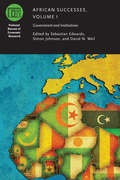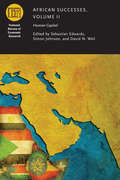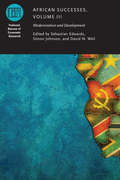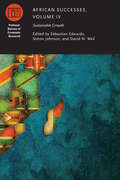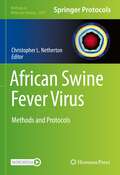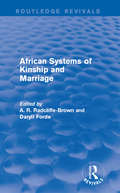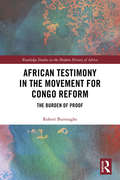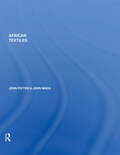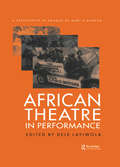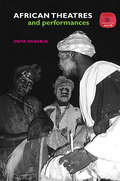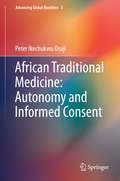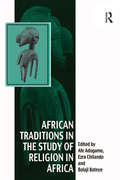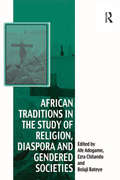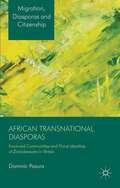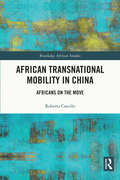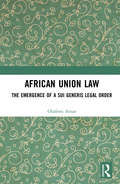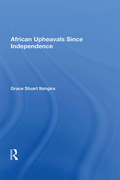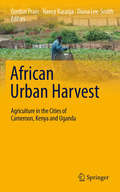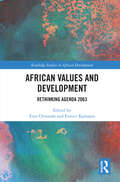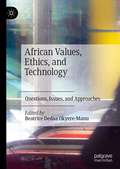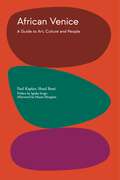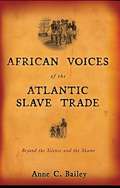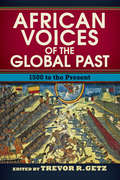- Table View
- List View
African Successes, Volume I: Government and Institutions
by Simon Johnson Sebastian Edwards David N. WeilStudies of African economic development frequently focus on the daunting challenges the continent faces. From recurrent crises to ethnic conflicts and long-standing corruption, a raft of deep-rooted problems has led many to regard the continent as facing many hurdles to raise living standards. Yet Africa has made considerable progress in the past decade, with a GDP growth rate exceeding five percent in some regions. The African Successes series looks at recent improvements in living standards and other measures of development in many African countries with an eye toward identifying what shaped them and the extent to which lessons learned are transferable and can guide policy in other nations and at the international level. The first volume in the series, African Successes: Governments and Institutions considers the role governments and institutions have played in recent developments and identifies the factors that enable economists to predict the way institutions will function.
African Successes, Volume II: Human Capital
by Simon Johnson Sebastian Edwards David N. WeilStudies of African economic development frequently focus on the daunting challenges the continent faces. From recurrent crises to ethnic conflicts and long-standing corruption, a raft of deep-rooted problems has led many to regard the continent as facing many hurdles to raise living standards. Yet Africa has made considerable progress in the past decade, with a GDP growth rate exceeding five percent in some regions. The African Successes series looks at recent improvements in living standards and other measures of development in many African countries with an eye toward identifying what shaped them and the extent to which lessons learned are transferable and can guide policy in other nations and at the international level. The second volume in the series, African Successes: Human Capital turns the focus toward Africa's human capital deficit, measured in terms of health and schooling. It offers a close look at the continent's biggest challenges, including tropical disease and the spread of HIV.
African Successes, Volume III: Modernization and Development
by Simon Johnson Sebastian Edwards David N. WeilStudies of African economic development frequently focus on the daunting challenges the continent faces. From recurrent crises to ethnic conflicts and long-standing corruption, a raft of deep-rooted problems has led many to regard the continent as facing many hurdles to raise living standards. Yet Africa has made considerable progress in the past decade, with a GDP growth rate exceeding five percent in some regions. The African Successes series looks at recent improvements in living standards and other measures of development in many African countries with an eye toward identifying what shaped them and the extent to which lessons learned are transferable and can guide policy in other nations and at the international level. The third volume in the series, African Successes: Modernization and Development looks at the rise in private production in spite of difficult institutional and physical environments. The volume emphasizes the ways that technologies, including mobile phones, have made growth in some areas especially dynamic.
African Successes, Volume IV: Sustainable Growth
by Simon Johnson Sebastian Edwards David N. WeilStudies of African economic development frequently focus on the daunting challenges the continent faces. From recurrent crises to ethnic conflicts and long-standing corruption, a raft of deep-rooted problems has led many to regard the continent as facing many hurdles to raise living standards. Yet Africa has made considerable progress in the past decade, with a GDP growth rate exceeding five percent in some regions. The African Successes series looks at recent improvements in living standards and other measures of development in many African countries with an eye toward identifying what shaped them and the extent to which lessons learned are transferable and can guide policy in other nations and at the international level. The fourth volume in the series, African Successes: Sustainable Growth combines informative case studies with careful empirical analysis to consider the prospects for future African growth.
African Swine Fever Virus: Methods and Protocols (Methods in Molecular Biology #2503)
by Christopher L. NethertonThis volume provides a compilation of methods that will aid researchers studying virology, immunology, and vaccinology of this devastating disease of swine. Written in the format of the highly successful Methods in Molecular Biology series, each chapter includes an introduction to the topic, lists necessary materials and reagents, includes tips on troubleshooting and known pitfalls, and step-by-step, readily reproducible protocols. Authoritative and cutting-edge, African Swine Fever Virus: Methods and Protocols aims to be a foundation for future studies and to be a source of inspiration for new investigations in the field.
African Systems of Kinship and Marriage (Routledge Revivals)
by A. R. Radcliffe-Brown Daryll FordeFirst published in 1950 and this edition in 1987, this book is one of the most wide-ranging and respected surveys on kinship and marriage in African social life. In his introduction, Radcliff-Brown provides a masterly analysis of the main features of African kinship systems and the theoretical problems arising from the study of them. The contributions range from examinations of kinship systems among the Swazi, the Tswana, the Zulu, the Nuer, and the Ashanti, to double descent among the Yakö and dual descent in the Nuba groups of the Sudan. The contributors themselves are still viewed as giants in their field: Evans-Pritchard, Meyer Fortes, Max Gluckman, Hilda Kuper, Naderl, A. I. Richards, Schapera and Monica Wilson.
African Testimony in the Movement for Congo Reform: The Burden of Proof (Routledge Studies in the Modern History of Africa)
by Robert BurroughsThe humanitarian movement against Leopold’s violent colonisation of the Congo emerged out of Europe, but it depended at every turn on African input. Individuals and groups from throughout the upper Congo River basin undertook journeys of daring and self-sacrifice to provide evidence of atrocities for the colonial authorities, missionaries, and international investigators. Combining archive research with attention to recent debates on the relation between imperialism and humanitarianism, on trauma, witnessing and postcolonial studies, and on the recovery of colonial archives, this book examines the conditions in which colonised peoples were able to speak about their subjection, and those in which attempts at testimony were thwarted. Robert Burroughs makes a major intervention by identifying African agency and input as a key factor in the Congo atrocities debate. This is an important and unique book in African history, imperial and colonial history, and humanitarian history.
African Textiles
by J. PictonAn illustrated survey of African textiles - their design, manufacture, and use - as part of African life, art, and culture.
African Theatre in Performance: A Festschrift in Honour of Martin Banham (Contemporary Theatre Studies #Vol. 35)
by Dele LayiwolaIn this lively and varied tribute to Martin Banham, Layiwola has assembled critical commentaries and two plays which focus primarily on Nigerian theatre - both traditional and contemporary. Dele Layiwola, Dapo Adelugba and Sonny Oti trace the beginnings of the School of Drama in 1960, at the University of Ibadan, Nigeria, where Martin Banham played a key and influential role in the growth of thriving Nigerian theatre repetoire and simulaneously encouraging the creation of a new theatre based on traditional Nigerian theatre forms.This comparative approach is taken up in Dele Layiwola's study of ritual and drama in the context of various traditions worldwide, while Oyin Ogunba presents a lucid picture of the complex use of theatre space in Yoruba ritual dramadar drama.Harsh everyday realitites, both physical and political, are graphically demonstrated by Robert McClaren (Zimbabwe) and Oga Steve Abah (Nigeria) who both show surprising and alarming links between extreme actual experiences and theatre creation and performance. The texts of the two plays - When Criminals Turn Judges by Ola Rotimi, The Hand that Feeds the King by Wale Ogunyemi, are followed by Austin O. Asagba's study of oral tradition and text in plays by Osofisan and Agbeyegbe, and Frances Harding's study on power, language, and imagery in Wole Soyinka's plays.
African Theatres and Performances
by Osita OkagbueAfrican Theatres & Performances looks at four specific performance forms in Africa and uses this to question the tendency to employ western frames of reference to analyze and appreciate theatrical performance. The book examines: masquerade theatre in Eastern Nigeria the trance and possession ritual theatre of the Hausa of Northern Nigeria the musical and oral tradition of the Mandinka of Senegal comedy and satire of the Bamana in Mali. Osita Okagbue describes each performance in detail and discusses how each is made, who it is made by and for, and considers the relationship between maker and viewer and the social functions of performance and theatre in African societies. The discussions are based on first-hand observation and interviews with performers and spectators. African Theatres & Performances gives a fascinating account of these practices, carefully tracing the ways in which performances and theatres are unique and expressive of their cultural context.
African Traditional Medicine: Autonomy And Informed Consent (Advancing Global Bioethics #3)
by Peter Ikechukwu OsujiThis book focuses on informed consent in African Traditional Medicine (ATM). ATM forms a large portion of the healthcare systems in Africa. WHO statistics show that as much as 80% of the population in Africa uses traditional medicine for primary health care. With such a large constituency, it follows that ATM and its practices should receive more attention in bioethics By comparing the ethics of care approach with the ATM approach to Relational Autonomy In Consent (RAIC), the authors argue that the ATM focus on consent based on consensus constitutes a legitimate informed consent. This book is distinctive insofar as it employs the ethics of care as a hermeneutic to interpret ATM. The analysis examines the ethics of care movement in Western bioethics to explore its relational approach to informed consent Additionally, this is the first known study that discusses healthcare ethics committees in ATM.
African Traditions in the Study of Religion in Africa: Emerging Trends, Indigenous Spirituality and the Interface with other World Religions (Vitality of Indigenous Religions)
by Ezra ChitandoThe historiography of African religions and religions in Africa presents a remarkable shift from the study of 'Africa as Object' to 'Africa as Subject', thus translating the subject from obscurity into the global community of the academic study of religion. This book presents a unique multidisciplinary exploration of African traditions in the study of religion in Africa and the new African diaspora. The book is structured under three main sections - Emerging trends in the teaching of African Religions; Indigenous Thought and Spirituality; and Christianity, Hinduism and Islam. Contributors drawn from diverse African and global contexts situate current scholarly traditions of the study of African religions within the purview of academic encounter and exchanges with non-African scholars and non-African contexts. African scholars enrich the study of religions from their respective academic and methodological orientations. Jacob Kehinde Olupona stands out as a pioneer in the socio-scientific interpretation of African indigenous religion and religions in Africa. This book is to his honour and marks his immense contribution to an emerging field of study and research.
African Traditions in the Study of Religion, Diaspora and Gendered Societies (Vitality of Indigenous Religions)
by Ezra ChitandoThe historiography of African religions and religions in Africa presents a remarkable shift from the study of 'Africa as Object' to 'Africa as Subject', thus translating the subject from obscurity into the global community of the academic study of religion. This book presents a unique multidisciplinary exploration of African Traditions in the Study of Religion, Diaspora, and Gendered Societies. The book is structured under two main sections. The first provides insights into the interface between Religion and Society. The second features African Diaspora together with Youth and Gender which have not yet featured prominently in studies on religion in Africa. Contributors drawn from diverse African and global contexts situate current scholarly traditions of the study of African religions within the purview of academic encounter and exchanges with non-African scholars and non-African contexts. African scholars enrich the study of religions from their respective academic and methodological orientations. Jacob Kehinde Olupona stands out as a pioneer in the socio-scientific interpretation of African indigenous religion and religions in Africa and the new African Diaspora. This book honours his immense contribution to an emerging field of study and research.
African Transnational Diasporas
by Dominic PasuraThis book examines the relationships, connections, identities and linkages between diasporas and their original or symbolic homelands. To highlight the transnationality of diasporas, the book proposes a framework for understanding African diasporas as core, epistemic, dormant and silent diasporas. As the book argues, transnational diasporas, just as other social formations, are multifaceted fluid entities which continually mutate over time and space. By way of empirical illustration, the book investigates the formation of the Zimbabwean diaspora by examining how the diaspora was dispersed, how it is constituted in Britain and how it maintains connections with the homeland. Using evidence from multi-sited ethnographic data, the book examines the articulation of plural diasporic identities by migrants in different social, cultural, religious and political settings. Whereas the concept of diaspora typically emphasizes group cohesion and solidarity, the book argues that the Zimbabwean diaspora has to be understood as fractured and fragmented.
African Transnational Mobility in China: Africans on the Move (Routledge African Studies)
by Roberto CastilloConsidering the African presence in China from an ethnographic and cultural studies perspective, this book offers a new way to theorise contemporary and future forms of transnational mobilities while expanding our understandings around the transformations happening in both China and Africa. The author develops an original argument and new theoretical insights about the significance of the African presence in Guangzhou, and presents an invaluable case study for understanding particular modes of transnational mobility. More broadly, it challenges forms of (re)presenting and producing knowledge about subjects on the move; and it transforms existing theorisations and critical understandings of mobility and its shaping power. Through an ethnographic approach, the book brings us closer to a number of practices, features and objects that, while characterising the lives of Africans in Guangzhou, are also evidence of the interplay between individual aspirations, and the structural constraints embedded in contemporary regimes of transnational mobility. Raising critical questions about ways of (un)belonging in the precarious settings of neoliberal modernity and the future of African mobilities, this book will be of interest to scholars of transnational, African and Chinese Studies.
African Traveler: The Story of Mary Kingsley
by Ronald SymeAfrican Traveler: The Story of Mary Kingsley by Ronald Syme
African Union Law: The Emergence of a Sui Generis Legal Order
by Olufemi AmaoThis book explores the emergence of African Union (AU) law as a legal order and its implications for existing order in the region. As an authoritative text on the development of AU law, the book covers such pertinent issues as legislative powers, competences, direct effect in AU law, subsidiarity, interventionism, and enforcement of laws. Olufemi Amao argues that there is a gradual movement from intergovernmentalism to supranationalism in the African Union legal order, and explores how this trajectory gradually and incrementally de-emphasises the discourse on nation state sovereignty; a concept that has caused many problems in the African context. Drawing upon EU law as a comparison, the book also examines how the development of supranationalism affects crucial issues such as human rights, democratic reforms, territorial matters, tribal and religious disputes, and economic relations. As a comprehensive examination of the development of law within a union, this book will be of great interest and use to students, scholars and practitioners in international law, international relations, and African studies.
African Upheavals Since Independence
by Grace Stuart IbingiraGrace Ibingira seeks the fundamental causes of the widespread upheavals (at least thirty-eight army coups in the past fifteen years) in African states today and finds them in the inadequate colonial preparation of African leaders for the responsibilities of independence, the earlier practices of "divide and raie, and the "winner-take-all policies o
African Urban Harvest: Agriculture in the Cities of Cameroon, Kenya and Uganda
by Gordon Prain Nancy Karanja Diana Lee-SmithOver the past two decades, how has urban agriculture changed in sub-Saharan Africa? Is city farming now better integrated into environmental management and city governance? And, looking ahead, how might urban agriculture address the needs of the low-income households and modernizing cities of Africa? In this book, leading specialists in the fields of urban agriculture and urban environment present a unique collection of case studies that examines the growing role of local food production in urban livelihoods in sub-Saharan Africa. Amongst many issues, the authors probe the changing role of urban agriculture, the risks and benefits of crop-livestock systems, and the opportunities for making locally produced food more easily available and more profitable. Concluding chapters reflect on the policy and governance implications of greater integration of urban natural resources and the built environment, an expanded role for urban agriculture in sub-Saharan Africa and the crucial role of women in urban food systems. African Urban Harvest will be of interest to decision-makers, development professionals, researchers, academics, and students and educators in urban planning, development studies, African studies, and environmental studies.
African Values and Development: Rethinking Agenda 2063 (Routledge Studies in African Development)
by Ezra Chitando Eunice KamaaraThis book considers the importance of African values, not only in catalysing development, but in sustaining it. Arguing for an urgent need for rapprochement between African politicians and intellectuals, the book discusses how African values and identities can contribute to the successful realization of initiatives such as the African Union’s Agenda 2063 and the United Nation’s Sustainable Development Goals (SDGs). Over the course of the book, the authors consider key themes such as identity, indigenous and modern worldviews; personhood; individual and communal perspectives; peace and conflict; and well-being. The book explores the role of religion and moral values, as well as African worldviews such as Ubuntu. Overall, the book demonstrates that African values will be central to galvanising Africa’s post-colonial transformation. This book will be an important read for policymakers and for researchers working on African development, politics, sociology, religion and philosophy.
African Values, Ethics, and Technology: Questions, Issues, and Approaches
by Beatrice Dedaa Okyere-ManuThis book charts technological developments from an African ethical perspective. It explores the idea that while certain technologies have benefited Africans, the fact that these technologies were designed and produced in and for a different setting leads to conflicts with African ethical values. Written in a simple and engaging style, the authors apply an African ethical lens to themes such as: The Fourth Industrial Revolution, the moral status of technology, technology and sexual relations, and bioethics and technology.
African Venice: A Guide to Art, Culture and People
by Shaul Bassi Paul KaplanAfrican Venice is the first guidebook to the extensive historical and contemporary African presence in the city of the lagoons. A set of ten walking tours highlights images of Black people in Venetian art from the Middle Ages to the present, the afterlife of Shakespeare’s Othello, the painful local legacies of slavery and Italian colonialism, and the remarkable visibility of African and Afro-descendant artists at the Venice Biennale. These tours are enriched by more than twenty essays, poems, and reflections that celebrate, question, and reimagine Venice’s Black past and present. From premodern paintings and sculpture to contemporary artworks, African Venice will show you the city as you have never seen it.The book includes contributions from Marilena Umuhoza Delli, Rita Dove, Emiliano Guaraldo, Eddy L. Harris, Lorenzo Lazzarini, Ibrahima Lö, Vittorio Longhi, Olga Manente, Tony Mochama, Yvonne Adhiambo Owuor, Caryl Phillips, Sandra Stocchetto, Sami Tchak, Ngūgī wa Thiong’o, and Alessandra Viola.
African Violets
by Sunset Publishing StaffHow to Grow African Violets discusses the history, origin, proper care and varieties of African Violets, one of the most popular houseplants of the 20th century.
African Voices of the Atlantic Slave Trade: Beyond the Silence and the Shame
by Anne BaileyIt's an awful story. It's an awful story. Why do you want to bring this up now?--Chief Awusa of AtorkorFor centuries, the story of the Atlantic slave trade has been filtered through the eyes and records of white Europeans. In this watershed book, historian Anne C. Bailey focuses on memories of the trade from the African perspective. African chiefs and other elders in an area of southeastern Ghana-once famously called "the Old Slave Coast"-share stories that reveal that Africans were traders as well as victims of the trade. Bailey argues that, like victims of trauma, many African societies now experience a fragmented view of their past that partially explains the blanket of silence and shame around the slave trade. Capturing scores of oral histories that were handed down through generations, Bailey finds that, although Africans were not equal partners with Europeans, even their partial involvement in the slave trade had devastating consequences on their history and identity. In this unprecedented and revelatory book, Bailey explores the delicate and fragmented nature of historical memory.From the Trade Paperback edition.
African Voices of the Global Past: 1500 to the Present
by Trevor R. GetzGlobal historical events are too often recounted exclusively through European and American voices. African Voices of the Global Past explores six major historical developments of global significance?the Atlantic slave trade, industrialization, colonialism, the World Wars, decolonization, and the development of modern feminism?from an African perspective. Voices emerge throughout the text in the form of primary sources that explore the personal accounts of individuals. These enable students to look beyond the indistinct figures of Africans in European and American accounts to see the people directly involved and affected by the major global changes they experienced. Featuring contributed chapters from renowned scholars, many from the continent of Africa or the African diaspora, African Voices of the Global Past offers a unique view of global history from a traditionally overlooked perspective. This book is a perfect supplement for world history and African history instructors seeking to relate a compelling narrative of major world events.
